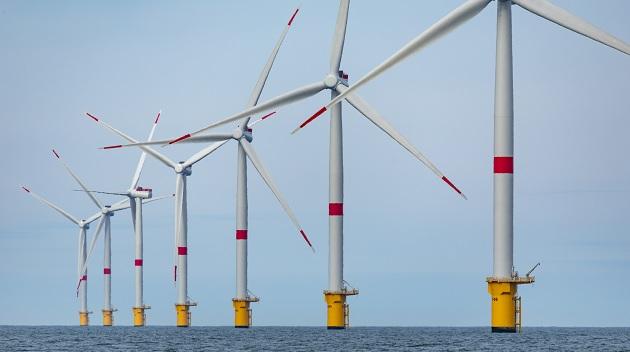Fécamp Begins Producing Clean, Green, Secure Energy off the French Coast
Enbridge and partners celebrate inauguration of Fécamp Offshore Wind Farm

Herring. Cod. All manner of shellfish. And a rich shipbuilding history, to boot.
For nearly a thousand years, right up to the 1970s, the French harbor city of Fécamp was associated primarily with the fishing industry.
Now, there’s a new harvest underway.
Today, in the small town situated on France’s northern coast in the presence of Roland Lescure, French Minister Delegate for Industry and Energy, Enbridge and its partners inaugurated the Fécamp Offshore Wind Farm, Enbridge’s second offshore wind energy project in the country.
The 497 megawatt (MW) Fécamp project consists of 71 offshore Siemens Gamesa turbines, each with a generation capacity of 7 MW, located between 13 and 22 kilometres off the French coast. Enbridge’s first French offshore wind farm, the 480-MW Saint-Nazaire project, entered service in November 2022 and was the first such project in the country’s history.
“The successful completion of the Fécamp Offshore Wind Farm marks a significant milestone for Enbridge and our project partners,” says Matthew Akman, Enbridge’s Executive Vice President of Corporate Strategy and President of our Power group.
The Fécamp project, whose ownership also includes EDF Renewables, CPP Investments and Skyborn Renewables has the capacity to supply 60% of the Seine-Maritime region, equivalent to about 770,000 people.
Enbridge’s plan to advance our offshore wind projects, including the 24 MW Provence Grand Large floating pilot project later this year, and the 448 MW Courseulles-sur-Mer (Calvados) in 2025 also aligns with France’s target of generating 33% of its energy from renewable sources by 2030 and achieving net-zero emissions by 2050.
“These projects further highlight our commitment to being a leader in the energy transition and providing reliable, clean and secure energy to the region,” says Akman.
Fécamp joins Enbridge’s portfolio of operational European offshore wind assets including: Saint-Nazaire (480 MW), Rampion (400MW) off the southern English coast, and Hohe See (497 MW) and Albatros (112 MW) projects off Germany’s north coast.
Working together: A long-term commitment
Throughout the development and construction phases over the past 12 years, the Fécamp Offshore Wind Farm project team has worked in close consultation with all local stakeholders, enabling optimal protection of the landscape and surrounding environment, and helping to ensure shared use of the sea.
Numerous meetings with fishing professionals, residents, elected representatives and other stakeholders have resulted in a project that combines a commitment to the energy transition, consideration of local needs and resources, and respect for the environment. For example, the configuration of the wind farm was adapted, with turbines aligned in the direction of the current to allow fishing.
Cooperation with local stakeholders and environmental monitoring measures will continue throughout the operational phase of the Fécamp Offshore Wind Farm.
A local industrial project in Normandy
For the past three years, the Fécamp Offshore Wind Farm has relied on a network of regional infrastructures and skills to help build the project.
This included construction of 71 gravity-based foundations and production of wind turbine blades, nacelles and generators in Le Havre, and pre-assembly of components in Cherbourg.
In all, the project created about 3,000 jobs in the Normandy region for project construction, and represents a total investment of about 2 billion euros.
With the maintenance base located on the Grand Quai peninsula in Fécamp, about 100 local jobs have been created to operate the wind farm. Day-to-day tasks will range from planning maintenance operations to optimizing electricity production.

